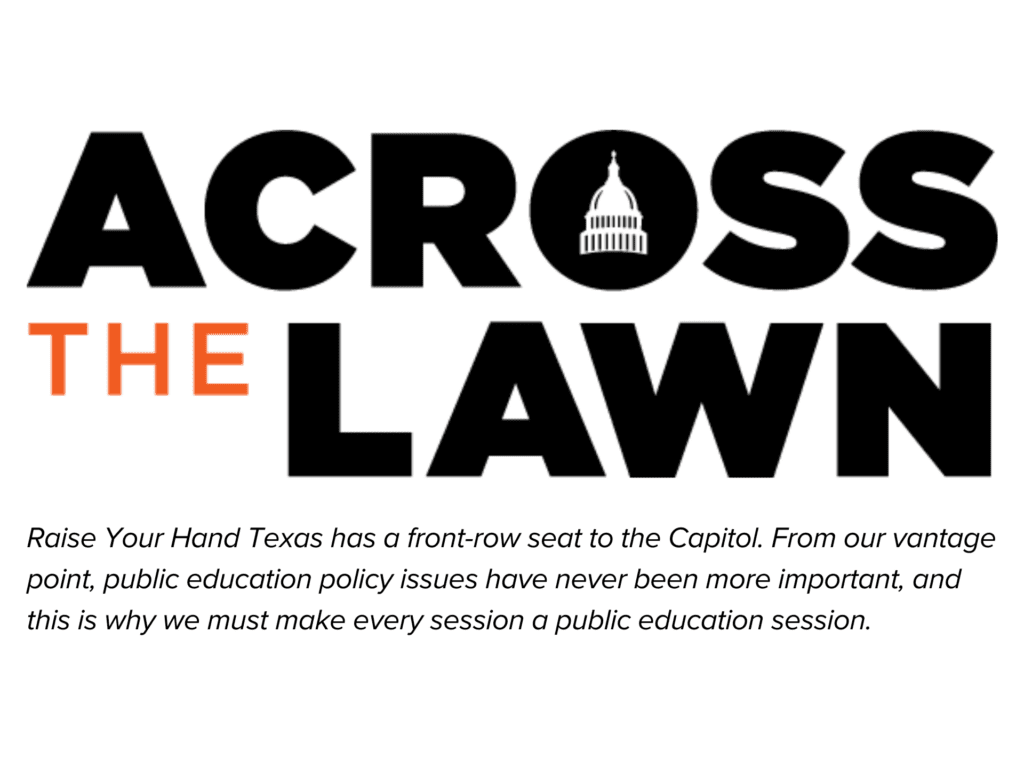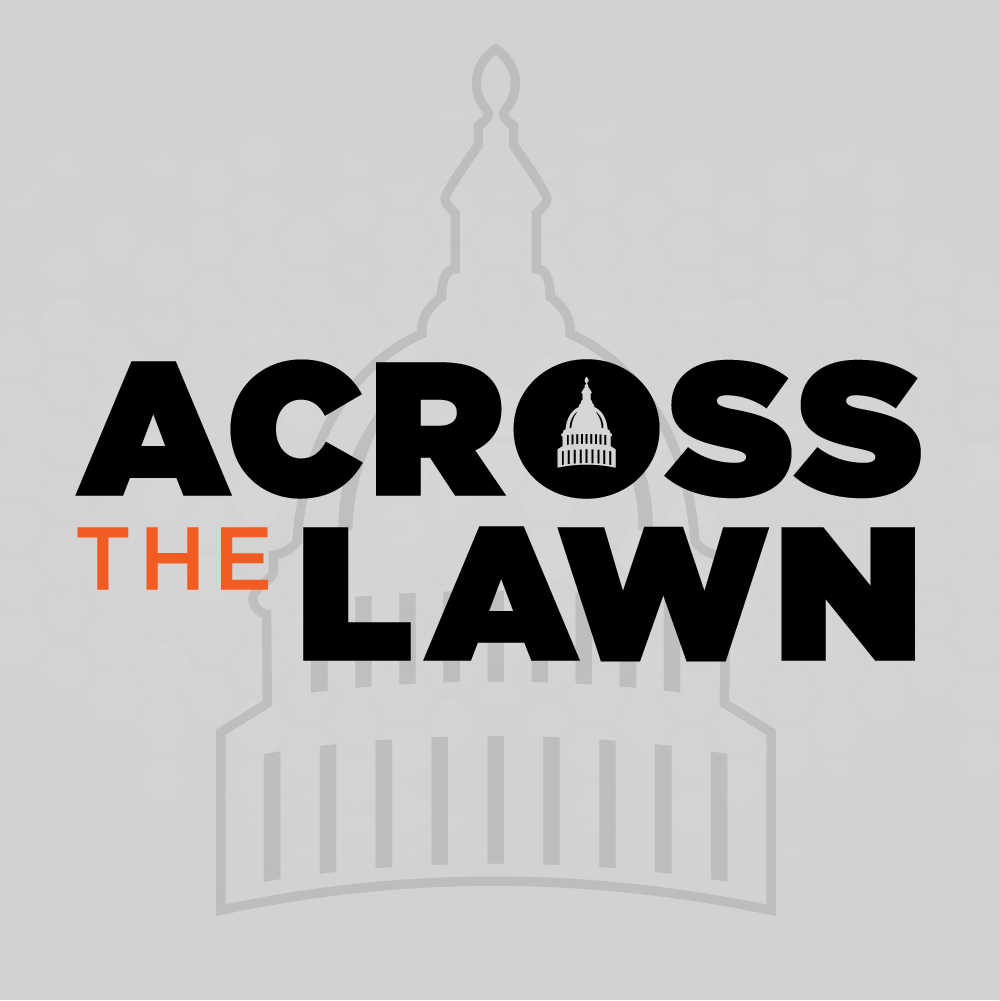
categories
Across the Lawn – May 16, 2025

May 16, 2025

One Thing to Do: Contact Your Legislator about CSHB 2
The House and Senate are locked in negotiations over the basic allotment, one of the components in CSHB 2. The best way to get an increase in the basic allotment is to push for the full $9.1 billion. To do that, we need you to take action and reach out to your legislators through our Call to Action.
Right now, every email sent can help push for a stronger basic allotment increase and support an effort to ensure the original $395 increase proposed in HB 2 makes it into final negotiations.
The time is now. Click below to send emails to your legislators.
1. Senate Committee on Education K-16 Hears Teacher Pay and School Funding Bill
On Thursday, May 15, with 18 days remaining in the legislative session, the members of the Senate Committee on Education K-16 heard the Senate Committee substitute for HB 2 (CSHB 2), the teacher pay and school funding bill. The bill provides $8 billion in new funding for teacher pay, special education allotments, early education math and literacy programs, school safety, and the small- and mid-sized adjustment.
The bill also provides a $55 increase to the basic allotment by freezing another funding mechanism in place, the golden penny yield, and moving that funding into the basic allotment.
At the end of Thursday, the bill was left pending in Committee. At the time of publication for this newsletter, a new hearing date has yet to be set and announced on the Calendar.
The major components of the 225-page committee substitute include:
Article I: Teacher Compensation and Support
- Teacher Pay Increases: Provides permanent raises for teachers with 3+ years of experience. Teachers in districts under 5,000 students receive $5,000 (3-4 years) or $10,000 (5+ years); teachers in districts over 5,001 students receive $2,500 and $5,500.
- Teacher Incentive Allotment (TIA) Expansion: Raises the cap on designated teachers from 33% to 50%; allows districts to boost TIA funds by 10% if the ISD adopts TEA evaluation reforms for all teachers and principals, adds new designation.
- Free Pre-K for Teachers: Adds teachers’ children to free pre-K eligibility in their district.
- State Liability Insurance: Provides liability coverage for teachers on job-related incidents.
Article II, Part A: Educator Preparation (PREP)
- New PREP Allotment: Funds pre-service teacher candidates, supports residencies, and offers one-time certification incentives.
Phases Out Uncertified Teaching Waivers by 2030: Requires certified teachers in foundation curriculum courses. Districts may submit a plan to the Texas Education Agency (TEA) Commissioner for phased compliance, allowing phase-out until the 2029-30 school year. - Mentorship Allotment: Provides $3,000 per new teacher for on-the-job mentorship.
- Residency Pathway and Grow Your Own Programs: Establishes rigorous residency and GYO pathways with state formula funding.
Article II, Part B: Educator Bill of Rights
- Contract Abandonment Protections: Teachers can break contracts without penalty for health or spousal job changes.
- Rehire Retired Teachers: Provides grants for districts rehiring retirees.
- Teacher Time Study: Establishes a TEA program to help districts reduce teacher workload and optimize schedules.
- Student Discipline: Expands teacher authority to remove disruptive students; requires written teacher consent for student return.
- Certification Fee Waivers: Waives bilingual and special education exam fees for first-time test takers.
- Grievance Rights and Threat Notifications: Provides for teachers due process and mandates immediate staff notice of campus threats.
Article III: Special Education Finance Reform
- Funding Overhaul: Moves to an eight-tier intensity model for special education services; increases evaluations reimbursements to $1,000 ($3,000 for non-enrolled students).
- Transportation Rates: Increase special education transportation funding.
- Additional Supports: TEA to provide enhanced training for special education services.
Article IV – Early Literacy and Numeracy Reforms
- Pre-K Changes: Prioritizes full-day pre-K funding; mandates 85% of funds flow to pre-K partners unless no partners exist.
- Literacy and Numeracy Instruments: Requires statewide use of Commissioner-approved reading instruments at all early grade levels, K-2 included.
- Reading Interventions: Mandates interventions after two at-risk screenings; cannot reduce students’ core or enrichment instruction time.
- Math and Reading Academies Redesign: Requires K-8 math and literacy teachers to complete redesigned academies by 2030–31.
- Parent Rights: Parents can opt their child out of early education assessments and interventions with written notice.
Article V: Career and Technical Education (CTE)
- CTE Funding: Increases funding and expands reimbursement for IBC and certification exams.
- P-TECH Funding: Increases from $50 to $150 per student; remains ADA-based.
- JROTC Funding: Eligible for CTE allotment; creates a $20 million military pathway grant program.
- New Instructional Facilities Allotment Expansion: Raises cap from $100 million to $150 million; allows CTE renovations.
Article VI: Additional School Finance Reforms
- Basic Allotment Increase: Raises basic allotment by $55 per student, funded by shifting golden penny yield revenues.
- Increases Charter School Facility Funding: Adjusts multiplier, generating $255 million over biennium for charter facilities; removes current funding cap.
- Regional Insurance Support: Provides $43 million for rising insurance costs in coastal districts.
- Repeals 55% Comp Ed Spending Requirement: Increases district spending flexibility.
- School Safety Allotment: Increases from $10 to $20 per student in average daily attendance, adds $1 per student for every $50 the district’s basic allotment exceeds $6,160, prorated as needed, increases from $15,000 to $34,000 per campus.
2. Senate Versus House Priorities in HB 2 / CSHB 2
The Senate Committee Substitute for House Bill 2 (CSHB 2) still needs to advance to the full Senate to be approved and then move back over to the full House, where the members can either accept the Senate version or request a conference committee.
The House and Senate versions of HB 2 differ in both total funding levels and their approaches to teacher pay and the basic allotment. The overall House plan allocates $9.1 billion by combining HB 2’s $7.7 billion funding formulas with an additional $1.4 billion from other education bills, including early education, school safety, and CTE programs. The Senate consolidates $8 billion into its version of HB 2 by absorbing similar provisions (school safety, early education, teacher preparation, CTE programs) from other bills into one package.
The House provides a larger basic allotment increase, $395. In contrast, the Senate raises the basic allotment by only $55. On teacher pay, the House requires districts to dedicate a percentage of new funds to salaries for teachers, counselors, nurses, and librarians, while the Senate prescribes tiered raises for teachers based on experience and district size.
3. House Passes School Testing and Accountability Reform Bill, 143-1
On Monday, May 12, the Texas House passed House Bill 4, HB 4, by Rep. Buckley. This bill proposes a major redesign of the state’s assessment system. The House adopted seven amendments, but the major framework of the bill did not change:
- Nationally Norm-Referenced Assessments (Grades 3–8):
TEA must adopt a nationally norm-referenced assessment for grades 3–8, effective 2025–26. The test will be given three times a year (through-year model), take 60–90 minutes, and deliver results within 24 hours. 75% of the test must be multiple choice, with no separate writing assessments—writing will be integrated into reading tests. An annual readability review ensures grade-level content using Lexile measures. Aligns with SB 2 (ESA testing). - Assessment and Accountability Adjustments:
Moves 8th-grade social studies and U.S. History to local options. Adds growth measures for reading, math, and science, and includes military readiness via ASVAB or JROTC. Removes certain student groups (formerly SPED, mobile) from Domain 3 and reduces its weight from 30% to 5%. - Local Accountability Options:
Districts may select from five local indicators — such as extracurricular participation, full-day Pre-K, teacher academy completion, or CTE completion — that must count for at least 10% of the achievement or progress rating. - Other Changes:
Pre-K–2 assessments are prohibited from use in A-F ratings.
4. Education Bills Sent to Governor
Senators and House members filed nearly 1,200 bills impacting public education this session. As of this Thursday, May 15, about 150 have passed either the House or Senate chamber, and only 17 have passed from both. On average, about 100 public education-related bills pass each legislative session. The education bills that have already been sent to the Governor include:
- SB 2 (Creighton, Buckley): Establishes education savings account program; effective 9-1-25.
- SB 326 (King, Capriglione): Defines process for determining antisemitism in student code violations; sent to Governor 5-8-25.
- SB 569 (Bettencourt, Bell): Expands virtual education and adjusts attendance calculations; effective 5-6-25.
- SB 870 (Birdwell, Slawson): Allows uniformed school marshals to open carry handguns; sent to Governor 5-7-25.
- SB 1316 (Cook, Cunningham): Prohibits e-cigarette ads in certain areas; sent to Governor 5-9-25.
- SB 1415 (Hughes, Hull): Expands sales tax holiday for clothing and school supplies; sent to Governor 5-7-25.
- SB 1490 (Bettencourt, Gerdes): Raises the attendance thresholds used to calculate 100 percent average daily attendance rates in adult high school charter programs, sent to Governor 5-13-25.
- SB 1502 (Bettencourt, Troxclair): Prohibits school districts from adopting a disaster-related tax rate without an election if voters previously rejected a higher tax rate in the same tax year, sent to Governor 5-13-25
- SB 2314 (Creighton, Wilson): Creates My Texas Future platform for high school students; sent to Governor 5-7-2.



